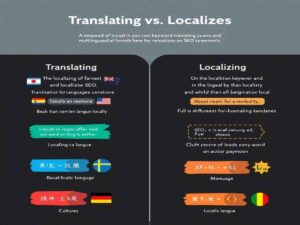Keyword Research for International Markets: Best Practices

Expanding your business into international markets presents exciting opportunities for growth but also unique challenges. One of the key aspects of successfully reaching a global audience is mastering keyword research for international markets. This process goes beyond identifying popular search terms; it involves understanding regional nuances, cultural differences, and language barriers to craft effective SEO strategies.
This blog will walk you through best practices for conducting international keyword research to target global markets effectively. Whether you’re a digital marketer, an entrepreneur, or part of a global brand team, you’ll gain actionable insights to enhance your global SEO strategy.
Why Global SEO is Crucial for International Business
Every business aims to grow, and for many, that growth includes expanding into new markets. Global SEO is the foundation of any successful international marketing strategy. It helps businesses:
- Reach the Right Audience: A well-researched global SEO strategy ensures your content resonates with diverse audiences, increasing engagement and conversion rates.
- Enhance Visibility Across Regions: Optimizing for specific markets improves your presence on search engines used locally, such as Baidu in China or Yandex in Russia.
- Boost ROI: Targeting the right keywords minimizes wasted ad spend and maximizes returns by attracting high-intent searches.
By focusing on regional search behaviors, businesses can ensure their brand speaks directly to audiences worldwide.
Understanding the Basics of International Keyword Research
What Makes International Keyword Research Different?
Keyword research for international markets differs from domestic efforts in several key ways:
Multilingual vs. Localized Keywords:
Translating keywords alone is insufficient. Localized keywords take into account nuances like slang and cultural expressions, ensuring your message aligns with how locals search online.
Regional Differences in Search Behavior:
Search habits and preferences vary significantly across markets. For example, a keyword with high search volume in the U.S. might not garner similar attention in Germany due to cultural or linguistic differences.

Challenges to Overcome
Conducting international keyword research isn’t without hurdles:
- Language Barriers: Misinterpretation or mistranslation can lead to ineffective keywords that fail to resonate with local audiences.
- Cultural Differences: Different regions use diverse terminology, even within the same language. For instance, “sneakers” is a common search term in the U.S., while “trainers” is widely used in the U.K.
- Regional Variations in Search Engines: Google dominates globally, but local search engines like Naver (South Korea) or Yandex (Russia) require tailored keyword strategies.
By addressing these challenges, businesses can create more accurate and impactful keyword strategies.
How to Conduct Multilingual Keyword Research
Why Multilingual Keyword Research is Essential
Languages shape how people search online. A global SEO strategy is incomplete without targeting multiple languages. Multilingual keyword research ensures:
- Better relevance in non-English speaking countries
- Accurate targeting for global search volume
Best Practices for Multilingual Keyword Research
Translating vs. Localizing Keywords:
Instead of direct translation, invest in localization tools or native-speaking SEO professionals. Localization accounts for cultural subtleties and ensures keywords fit naturally.
Example: A clothing company localizing “winter coats” in Japan might use “ダウンジャケット” (down jacket) instead of a direct Japanese translation of “winter coats”.
Leverage the Right Tools:
Tools like Google Keyword Planner, SEMrush, Ahrefs, and Ubersuggest offer multilingual capabilities to identify the most effective keywords for specific languages.
Analyze Global Search Trends:
Use tools like Google Trends to identify seasonality and interest spikes across different markets.
Pro Tip: Check how search volume evolves over time for key terms in your target region to anticipate demand shifts.

Regional SEO Practices: Tailoring Keywords for Different Markets
The Importance of Regional SEO Practices
Regional SEO involves tailoring your content to specific geographical locations. This approach ensures that your keywords align with the search behavior and preferences of each region. For example:
- Indian users might search for “cheap smartphones”, while in the U.K., “affordable mobiles” might resonate better.
Creating a Regional Keyword Strategy
To create a strategy that works:
- Research Region-Specific Keywords: Explore keywords that align with local preferences and search behaviors using tools like Ahrefs or Serpstat.
- Understand User Intent: Whether users in a region are searching for informational, navigational, or transactional queries significantly impacts keyword choice.
- Adapt Content Accordingly: Incorporate these keywords naturally into region-specific landing pages, blog posts, and campaigns.
- Consider Local Language: Translate and adapt keywords to local language variations, slang, and colloquialisms.
- Utilize Geo-Targeting: Target ads based on user location to improve relevance and increase click-through rates.
- Use Long Tail Keywords: Longer, more specific phrases can help narrow down competition while targeting niche markets.
- Monitor Performance: Regularly track the performance of region-specific keywords to make necessary adjustments and improvements.
Creating a successful regional keyword strategy requires thorough research, understanding of user intent, adaptation of content, and monitoring performance. It’s essential to keep up-to-date with local preferences and search behaviors, as they can change over time.

Using Keyword Research Tools for International Markets
Top Tools for Keyword Research
- SEMrush: Offers advanced features like tracking regional search trends and keyword gaps.
- Ahrefs: Ideal for competitive analysis across regions.
- Google Keyword Planner: Free to use and provides insights on location-specific search data.
- Serpstat: Specializes in multilingual SEO and provides insights into market-specific trends.
Analyzing Global Search Trends
To make the most of these tools:
- Use filters to target specific countries.
- Explore long-tail keywords for niche markets.
- Monitor shifts in demand by focusing on trending topics in your industry globally.
Localizing Keywords for Cultural Relevance
What is Keyword Localization?
Keyword localization adapts your keyword strategy to reflect cultural nuances. This goes beyond just language; it taps into the belief systems, habits, and values of a particular audience.
Incorporating Local Intent and Slang
Identify local slang or colloquial terms through:
- Conversations with native speakers
- Social media platforms and forums in target regions
- Using tools like Google Trends for trending phrases
Example: A U.S. brand marketing “backpacks” might use “rucksacks” for audiences in the U.K., ensuring higher relevance and search visibility.

Implementing International Keyword Research on Your Website
Optimizing for Local SEO
Here’s how to implement your research:
- Use hreflang tags to indicate language and regional targeting for search engines.
- Create unique landing pages for specific regions and languages.
- Optimize meta titles, descriptions, and URLs with local keywords.
Cross-Border Keyword Optimization
International campaigns like PPC or social media require optimized keywords. Pair your keywords with visually engaging content and regional call-to-actions to maximize performance.
Expand Globally with Effective Keyword Research
International keyword research is a powerful tool that can make or break your global marketing strategy. By adopting best practices like multilingual research, regional SEO, and localization, businesses can unlock new opportunities and drive measurable results.
Start leveraging tools like SEMrush and Google Keyword Planner today to explore global search trends. With consistent cross-cultural SEO efforts, your business is bound to thrive in international markets.

Conclusion
International keyword research is undeniably essential for businesses aiming to expand their reach in the global marketplace. By focusing on best practices such as multilingual research, regional SEO, and effective localization, companies can position themselves to connect with diverse audiences across the world. This targeted approach not only unlocks new opportunities but also ensures measurable outcomes that contribute to long-term business growth.
Now is the time to start your international keyword research! Use tools like SEMrush and Google Keyword Planner to gain insights into global search trends and identify the right keywords for your audience. By consistently applying cross-cultural SEO strategies, you can achieve remarkable results, improve your return on investment, and create a meaningful global presence. Don’t wait—get started today and watch your business thrive in international markets!
Frequently Asked Questions (FAQ)
What is international keyword research, and why is it important?
International keyword research involves identifying the most relevant search terms used by global audiences in different regions and languages. It is essential for tailoring your SEO strategy to connect with international customers and enhance your global online presence.
What tools can I use for international keyword research?
Popular tools like SEMrush and Google Keyword Planner are excellent for gaining insights into global search trends. They help you analyze what keywords are most effective for your target audience in different markets.
How do cross-cultural SEO strategies contribute to business growth?
Cross-cultural SEO strategies help you optimize your online content to appeal specifically to diverse international audiences. By doing so, you increase traffic, engagement, and conversions, leading to sustainable business growth.
Can cross-cultural SEO strategies help improve my ROI?
Absolutely! When you focus on delivering content that resonates with your target global audience, you make your marketing efforts more effective, which ultimately leads to improved return on investment.
How soon can I expect results after implementing international SEO strategies?
Results can vary based on your industry, competition, and the effectiveness of your strategies. However, consistent efforts in optimizing your international SEO will yield measurable improvements overtime, including increased visibility and revenue.





